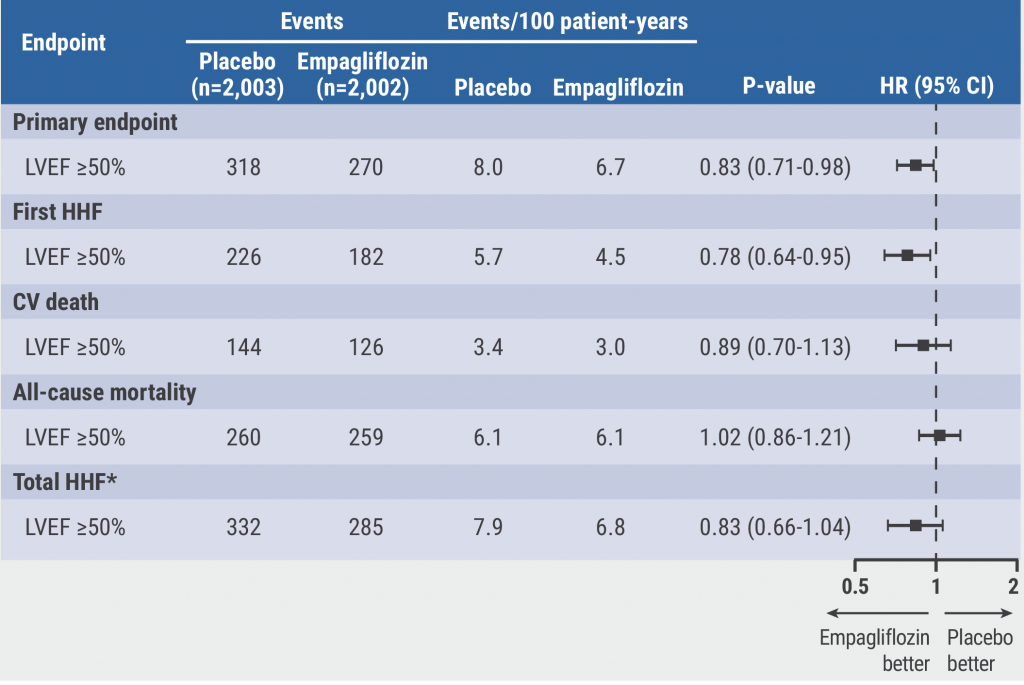https://doi.org/10.55788/7e4538f3
Depression and anxiety disorders are common in HF patients and are associated with adverse outcomes [1]. A study presented by Dr Adesegun Kuye (Kharkiv National Medical University, Ukraine) explored whether metabolic disturbances are associated with the risk of depression and its severity in HF patients [2]. The study included 154 participants with HF of ischaemic origin and divided them into 4 groups: group 1 (n=42) included patients with HF and concomitant diabetes mellitus and obesity; group 2 (n=46) included patients with HF and concomitant diabetes mellitus only; group 3 (n=36) comprised of obese patients with HF; and patients in group 4 (n=30) had HF without metabolic comorbidities. The Beck Depression Inventory (BDI) was used to estimate the presence and origin of depressive disorders.
The presence of metabolic dysfunctions was associated with the presence and severity of depressive symptoms. Only 4.8% of participants in group 1 had no symptoms of depression, 33.5% suffered from mild depression, 26.2% from moderate depression, 26% from moderately severe depression, and 9.5% from severe depression. HF patients with type 2 diabetes (group 2) had mild (52.2%), moderate (21.7%), moderately severe (15.2%), and severe (3.1%) depression. Obese HF patients (group 3) had mild (55.6%) or moderate (25%) depression. Lastly, 60% of HF patients without accompanying metabolic dysfunction had signs of mild depression only, and 40% did not show any signs of depression.
To estimate the impact of metabolic disorders on the development of depression, odds ratios (OR) were determined for each group: Those with both metabolic dysfunctions an OR of 30 (95% CI 4.47–200.97), those with type 2 diabetes an OR of 7.2 (95% CI 1.40–36.50), and obese HF patients had an OR of 2.7 (95% CI 0.60–12.50) to develop depression. Although the link between metabolic factors and depression may be an association, the findings support the complexity of care in patients with more comorbidities.
- Celano CM, et al. Harv Rev Psychiatry 2018;26:175-84.
- Kuye AJ, et al. Severity of depressive disorders in chronic heart failure patients with ischemic heart disease depending on concomitant metabolic disturbances. Session e-Posters station 8, Heart Failure 2023, 20–23 May 2023, Prague, Czechia.
Copyright ©2023 Medicom Medical Publishers
Posted on
Previous Article
« Standardised diuretic protocol significantly increases natriuresis in acute HF Next Article
VOICE-COVID-II : Alexa successful in SARS-CoV-2 symptoms screening »
« Standardised diuretic protocol significantly increases natriuresis in acute HF Next Article
VOICE-COVID-II : Alexa successful in SARS-CoV-2 symptoms screening »
Table of Contents: HFA 2023
Featured articles
Chronic Heart Failure — What You Need to Know
Sacubitril/valsartan reduces natriuretic peptides in HF patients with ejection fraction >40%
Clinically relevant reduction in HF hospitalisation due to haemodynamic monitoring
TRACER-HF: Trientine reduced biomarkers up to 8 weeks
Dapagliflozin improves LAVI, LV mass, and concentration of natriuretic peptides after 6 months
NUDGE-FLU: Repeated electronic nudges improve flu vaccination rates in patients with HF
Novel Therapeutics in Cardiomyopathy
Patisiran benefits maintained over 18 months in patients with transthyretin amyloidosis
Aficamten may lower symptom burden in non-obstructive hypertrophic cardiomyopathy
What is New in Acute Heart Failure?
Standardised diuretic protocol significantly increases natriuresis in acute HF
Low concentrations of VEGF-C: a negative prognostic factor
Prevention and Comorbid Conditions of Heart Failure
VOICE-COVID-II : Alexa successful in SARS-CoV-2 symptoms screening
HF patients with metabolic dysfunction at high risk to develop depressive symptoms
Best of the Posters
Frequent co-existence of atrial fibrillation and obstructive sleep apnoea in stroke patients
Protein-bound uremic toxins predict HF events and death in patients with CKD
Related Articles
August 8, 2023
Low concentrations of VEGF-C: a negative prognostic factor

© 2024 Medicom Medical Publishers. All rights reserved. Terms and Conditions | Privacy Policy
HEAD OFFICE
Laarderhoogtweg 25
1101 EB Amsterdam
The Netherlands
T: +31 85 4012 560
E: publishers@medicom-publishers.com

